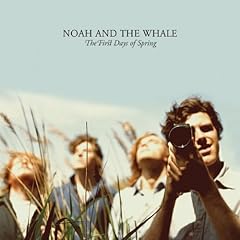
Charlie Fink and friends’ second album was always going to be an interesting proposition. The follow up to a well-received debut that swept Noah and the Whale from the vanguard of the burgeoning anti-folk scene into the big leagues thanks to the phenomenal success, popularity with whistlers everywhere and general radio and TV ubiquity of the single ‘5 Years Time’ could have gone either way. Rush-write and release more of the same perky folk to capture those all important record sales, or distance yourselves from the very thing everyone knows you for?
Whether by circumstance or design (The First Days of Spring documents, or at least references, Fink’s break up with Laura Marling), Noah and the Whale’s sophomore record wholeheartedly surrenders to the latter path, and it might just be the best thing that ever happened to them. It is standard PR fare to label a band like Noah and the Whale’s “difficult” second album as “more mature” or stating that the band has “grown up”, and these are indeed the kind of noises that have been surrounding the release of The First Days of Spring. But rarely can there have been such a stark departure, such a musical growth spurt. Though lyrically adept and with its fair share of dark moments, the often lackadaisical folk of debut Peaceful the World Lays Me Down – epitomised by ‘5 Years Time’ – is replaced by a richly atmospheric concept album detailing the heartbreaking end to a relationship and desperately search for the ability to move on. This time it is the electric guitar not the acoustic that is fingerpicked, the orchestral moments – be they string or brass – sweeping and intense rather than joyful.
The subject matter is far from revolutionary song material, but here it is handled with such deftness and honesty, detailing of the minutiae of exactly what it feels like to break up with someone you love, that you can’t fail to be intoxicated by it. More a song cycle than a conventional album, motifs recur throughout The First Days of Spring (not least that very season) – both musically and lyrically – as it proceeds on its journey. A chorus from one song will end up in an entirely different one (the ‘Blue Skies’ chorus appears at the culmination of ‘Our Window’, for example), while the sound of the lonely electric guitar and yearning violin flit in and out, with orchestral moments used to communicate the force of emotion, good and bad. This all reinforces the oppressive, overbearing mood of the record as it moves from stage to stage of the break up. It leads you through the dark days after a split, through the attempts to move on, the knowledge you’re going to get over it (just not yet), to the inevitable acceptance that life goes on.
From the opening heartbeat of a bass drum, every layer of the album seems clearly thought out, and they sit together in arresting fashion. What was an almost entertainingly lugubrious deep west country voice on Peaceful the World Lays Me Down, Fink’s vocals are perfect to detail in staccato words the pervading depression of the breakdown of the relationship, fitting the moroseness as well as a Leonard Cohen or Ian Curtis. Lyrically The First Days of Spring covers all bases with equal dexterity: from the straightforward communication of the awkwardness of language in such times (“You are talking like a stranger so I don’t know what to do”), through cutting statements (“I do believe everyone has one chance to fuck up their lives”) and pastoral metaphors along the springtime theme of rebirth (“Like a cut down tree I will rise again”), to some beautifully ornate phrasing (“I’m a fox trapped in the headlights and I’m waiting for the tyres to spin over me”). And all the while the swirling strings, the thudding bass drum and the sweep from quiet piano or guitar to majestic orchestral cacophony convey the emotional intensity dripping from the words. Female backing vocals are deafening by their absence in comparison to the first album, too, and whether deliberate or not it is indicative of the songs’ subject matter: the outpourings of a lonely and brokenhearted man.
The album is chronologically split in two, the pit of despair following the break up of the first half – as exemplified by the miserable ‘I Have Nothing’ (“'I love nothing, I love no one' are words that you whisper in my mind to someone I don’t know”) – and the more uplifting second half where acceptance kicks in, most notably the soaring single ‘Blue Skies’. As such the one incongruous moment comes in the central choral pieces, ‘Instrumental I’ and ‘The Love of an Orchestra’, which sound like they could have been taken from the score of The Sound of Music. As a tool to provide the bridge between the two halves they work fine, but as a result of this very contrast ‘The Love of an Orchestra’ is the one song that is easy to skip through. It is, however, followed by ‘Stranger’, which so successfully paints the scene of a rebound one night stand that any worry about the quality of the second half of the album is soon dispelled. For the four songs that provide the denouement to the story are at least the equal of those that set the scene, and we are even treated to some acoustic guitar strumming and singalongs (particularly the “I know in a year I’m gonna be happy, I know in a year it’s gonna be better” refrain), reflecting the more positive outlook.
In a world where music is increasingly disposable and has a shelf-life as short as our ever withering attention spans, Noah and the Whale have made an album that is worth its weight in gold. For it is one where you feel every word and every note means something to its writer, that blood, sweat, tears and real human emotion have gone into both its formulation and execution – and that is a rare commodity indeed. Impressive in almost every regard, it may not be what fans of ‘Five Years Time’ are looking for or were expecting, but it is at the end of the day a record you will – or at least you should – want to play again as soon as it ends. If you have ever been through the heartbreak at the end of a relationship, that is. Flawless it isn’t, but such is the ambition (emphasised by the album’s poignant companion film, also written and directed by Charlie Fink), quality and sheer beauty of The First Days of Spring, that you can’t fail to be moved by it. As Fink sings on the National-esque ‘Slow Glass’, “it’s not just music...the pain’s not brief”: this record is his catharsis, and its catharsis must surely resonate with all who listen to it.
****
First published on rockfeedback.com.




No comments:
Post a Comment